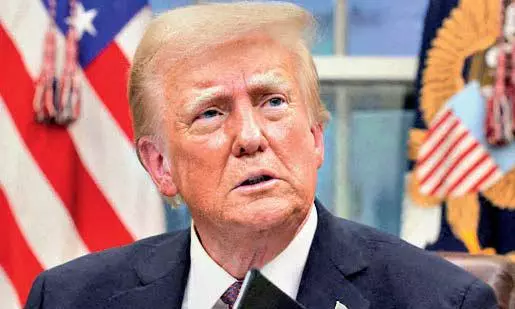AA Edit | Tackling Trump Major Challenge for India
India denies Trump's boast about mediating a ceasefire between India and Pakistan, reaffirming its role.

It is in Donald Trump’s DNA to declare victory. He did so even when he lost the US presidential election to Joe Biden in 2020, declaring that victory had been stolen from him.
How do you cope with a problem like Trump, who knows only victory, real or imagined?
Trump has just declared that he stopped a nuclear war between India and Pakistan, which would probably move him a few rungs up the Nobel Peace Prize contention ladder. But India had to officially deny his claim in which he said he had used the bait of “lots of trade” with the US to broker a historic ceasefire without which millions of people would have died.
India has had to put itself in the embarrassing position of having to call Trump’s braggadocio just as it had exposed Pakistan’s nuclear card bluff to force it to ask for a ceasefire after Pahalgam and all that transpired since that dastardly attack on civilians and the consequent strikes on Pakistan’s airfields.
Trump views the world through a prism that only lets him see everything as victory. Having boasted that he would end the Ukraine war in a day and that he had brought Israel’s bombing of the Gaza Strip to an end before he had even crossed the White House portal, it was on the cards that he would claim a win as mediator in a conflict in which he did try to intercede by getting his secretary of state-cum-NSA to talk to the two nations at different levels.
On the other hand, India, having declared to the world that it had the better of the exchanges with Pakistan in aerial combat with assorted missiles, drones and munitions and so forcing Pakistan to plead for a ceasefire, is currently dealing with a perception problem in which the world views the Indian subcontinent only as a binary and the media cliché of nuclear-armed neighbours going to war or coming frighteningly close to it.
Adversaries going out to dinner together is the simplistic solution offered by Trump, the mediator in two wars, as if the world’s problems could be solved by breaking bread or a nan.
Even then, India must play up to Trump because it has gone too far down the road to being identified as a friend of the US — and of Trump whose friendship with Prime Minister Narendra Modi assumed folklore proportions after their meetings in the US President’s first term — which is placed advantageously as a geopolitical counterweight to China.
President Trump often takes extreme positions, only to back down and then declare a win.
This pattern has been observed from his trade war tariffs that have yo-yoed between triple figures and numbers nearer zero. To humour him as fabulously wealthy deal makers have done with their extreme riches in the Middle East may not be something India can afford.
India’s clout as an intending purchaser of much more military equipment from the US and its strategic position in the geopolitics of today leaves scope for smart moves that do not include rubbing it into Trump, the eternal victor. There is no way that India will sit at a table to discuss the Kashmir issue with Pakistan and the United Nations that has as much power as a guard on a slow goods train cannot make it do that either.
To ensure the promise of peace in the air flowers is more important than arguing over how the ceasefire came about. Having spelt out its doctrine on fighting terror in an unambiguous way, India must move on to a phase where to guarantee the safety of its people must be its own business, as also the territorial integrity of India in which Jammu & Kashmir is an integral part.
